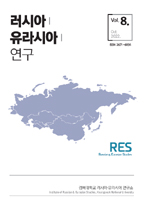- 영문명
- “Viy” - A Prototype of Fall and Punishment
- 발행기관
- 경북대학교 러시아-유라시아 연구소
- 저자명
- 전민규(Minkyu Jeon)
- 간행물 정보
- 『러시아유라시아연구』제13호, 43~62쪽, 전체 20쪽
- 주제분류
- 인문학 > 기타인문학
- 파일형태
- 발행일자
- 2025.04.30

국문 초록
니콜라이 고골의 중편소설 「비이(Вий)」는 민속적 전승을 바탕으로 한 듯 보이지만, 실상은 고골 특유의 창작과 상상력이 결합된 작품이다. 본 논문은 이 작품을 ‘뒤집힌 성자전’으로 해석하며, 주인공 호마 브루트가 겪는 시련과 죽음의 의미를 분석한다. 호마는 신학교 학생이라는 지위에도 불구하고 식욕과 성욕에 충실한 인물로 묘사되며, 이러한 육체적 욕망은 결국 그를 파멸로 이끈다. 특히 작품은 성경 속 ‘광야의 시련’과 ‘무덤 속의 사흘’을 패러디함으로써 기독교적 구원의 도식을 전복한다.
호마가 죽음에 이른 근본 원인은 단순한 욕망이 아닌 ‘나태(acedia)’로, 이는 감각적 쾌락에 집착함으로써 영적 길을 포기하게 되는 죄다. 작품은 호마의 개인적 타락을 넘어서 사회 전체의 영적 마비를 묘사하며, 악이 만연한 세계에서 인간이 구원의 가능성을 외면한 채 살아가는 모습을 비판적으로 보여준다. 또한, 작품 말미에 등장하는 괴물 ‘비이’를 호마 자신의 죄악을 반영하는 거울상으로 해석하며, 호마의 죽음은 자기 자신을 정면으로 마주했을 때 발생한 충격의 결과로 이해된다.
본 연구는 「비이」를 고골의 후기 작품에 등장하는 나태와 자리(위계) 문제의 초기 형태로 파악하며, 고골 문학 세계 전반에 걸쳐 나타나는 타락과 징벌의 주제에 대한 통찰을 제시한다.
영문 초록
Nikolai Gogol’s novella “Viy” appears to be based on Ukrainian folklore, yet it is, in essence, a product of Gogol’s imaginative storytelling. This paper interprets “Viy” as an “inverted hagiography,” analyzing the trials and ultimate death of the protagonist, Khoma Brut. Despite his position as a seminary student, Khoma is portrayed as a character driven by gluttony and lust – carnal desires that ultimately lead to his downfall. The story subverts biblical motifs such as the “trial in the wilderness” and the “three days in the tomb,” turning them into a grotesque parody of Christian redemption.
The root of Khoma’s demise is not merely desire, but acedia or spiritual sloth which manifests as an obsession with physical pleasures and a neglect of spiritual growth. Beyond Khoma’s individual fall, the narrative exposes a world afflicted with spiritual apathy and moral decay. The monster Viy, who ultimately causes Khoma’s death, is interpreted as a mirror image of Khoma himself, symbolizing his confrontation with his own sins. His death represents the psychological shock of facing his inner corruption.
This study argues that “Viy” reflects an early form of the themes of degeneration and punishment that appear more fully developed in Gogol’s later works. It provides insight into Gogol’s moral universe, where sin is not only personal but deeply embedded in society, and spiritual blindness invites inevitable judgment.
목차
Ⅰ. 서론
Ⅱ. 뒤집힌 성자전
Ⅲ. 「비이」 속 죄와 징벌
Ⅳ. 결론
참고문헌
해당간행물 수록 논문
참고문헌
최근 이용한 논문
교보eBook 첫 방문을 환영 합니다!

신규가입 혜택 지급이 완료 되었습니다.
바로 사용 가능한 교보e캐시 1,000원 (유효기간 7일)
지금 바로 교보eBook의 다양한 콘텐츠를 이용해 보세요!


